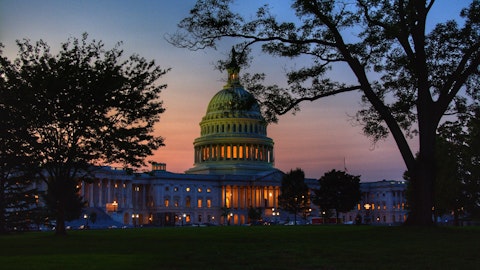Ronald Josey: Brian, you mentioned investments for 2023 and extending beyond the core, that’s been a key question that we consistently get in terms of what’s next. Any insights you can provide there would be helpful, maybe just is it building out the tech infrastructure? Or is it more sort of newer products that are coming down the pike? And then I believe in the letter, we talked about 1.4 billion cumulative guest arrivals. And so I was wondering if you can talk more about the brand, the awareness overall and just that user mix in terms of returning users versus newer users.
Brian Chesky: Yes. Awesome. Well, let me start with investments for 2023. So the good news is that — though we’re investing this year and some new products and services to expand beyond the core, I don’t think you’re going to see any material changes in the P&L. We kind of think like I started my in my 2 friends. We didn’t have very many resources back then. And the great thing about Airbus business is we’re essentially a global network. So I think that we can incubate new opportunities, products and services for a relatively low amount of investment. And as far as what you’re going to see, I’d say there’s going to be innovations on the guest and host side. On the host side, our general principle is that we want to always deliver more value for host number charging.
And we have a 3% take rate on the host side, and we’ve been giving away a lot of products for free, like AirCover. And we launched aircover for host 2 Novembers ago. NPS for claims, reimbursement claims has gone up 70 points, so it’s been pretty amazing. And our general view on host are we’re going to primarily give away most of our product service and innovation to them. But we do think there’s some opportunities for eco services that Host might pay for. On the guest side, we started very modestly. You might have seen that we launched travel insurance, which is now in 8 countries, and that’s been really, really successful. But I think there’s many more opportunities around the like services. Obviously, Airbnb experiences is something that we’re beginning to really ramp up.
And I think you’re going to see a lot more traction in that product in the coming years. And I think there’s going to be just a lot more around creating a step change in new service level and matching people to the right homes and experiences for them. So that’s what I would say. Services on the host side, services on the guest side, there’s going to be a lot of opportunities to revisit some of the end-to-end travel opportunities that we have, and you’ll stay tuned for some cool innovation. Oh, I’m sorry, brand awareness, sorry. Yes, brand awareness. On the brand awareness, again, we generally try to — as I said the last part, we generally focus on a full funnel approach. 90% of our traffic is now direct. It’s sustained that since we went public, it’s always been about 90%.
We have extremely high efficiency on things like performance marketing. And generally, the way we approach our brand is that Airbnb is a pretty ubiquitous brand. So what we really want to do now is continue to invest in awareness around our different innovations. And there are going to be 2 things. Number one, we’re going to be focused on educating people on our new services and offerings. So for example, there will be categories we’ve been running campaigns around that. And people have viewed 500 million — people viewed listings, 500 million times for every categories. We’re also continuing to raise awareness around hosting. We’re going to grow as fast as we have host. Now as far as how much traffic is coming from new returning, I don’t know, Dave, do you want to share anything about that on where branded?
David Stephenson: Yes. I mean the majority of our bookings come from past guests, and it’s actually been the strong guest retention that we’ve had over years since the beginning of Airbnb, that’s been a powerful driver of our growth. But I think what’s also interesting is that we’ve introduced Airbnb to millions of new users since COVID. And the performance of those new users, the booking frequency of those new users from ’21 that we saw into ’22 has been very strong. And so really pleased with the new users that we’ve been able to track that look very, very similar to the historic type of users that we’ve had on Airbnb.
Operator: Your next question comes from the line of Mark Mahaney with Evercore.
Mark Mahaney: Okay. Two questions, please. I know you mentioned that guess to host ratio, I think you said something like 36% or something. I imagine you’ve got cohort data that shows that the percentage of guests that have converted into being host or and additionally, our host is actually higher, maybe much higher. Could you just qualify that or quantify that at all? I’m sure that’s a pipeline, but just how robust is that pipeline when you look at the cohort data? And then just very briefly on China. Just on the China outbound, can you just remind us how material that was to your business back when back in 2019, so we can get a sense of — I know you’ve said that the China outbound market will gradually reopen — but as it fully reopens, how much of an opportunity that is for you?
Brian Chesky: Yes. I mean I’ll start, Mark. Yes. We’ve seen that third in Q4 2022, 36% of new available hosts who started out as guest in Airbnb. This is more than prior year. So this has been going up actually like year-over-year. So that number is going up. And it makes sense as Airbnb becomes more ubiquitous, but also it makes sense because a lot of people, they’ll connect with a host, and they realize, wow, I can do this too. And the vast majority of our new listings are by individuals, not property managers. So there’s this kind of interesting network effect where guest becomes host and then host becomes guest. As far as China, we expect the recovery to be pretty gradual in China. We think the big prize in China is the outbound business.
We think that there are going to be hundreds of millions of people that want to leave China to travel the world, and we think is going to be the best way for essentially Gen Z people to travel. I think they really want an authentic experience when they’re traveling around the world. That being said, we are expecting a pretty gradual recovery in China.
David Stephenson: And China kind of pre-COVID was in the kind of low single-digit percentage of our gross booking value. So it gives you some perspective of our opportunity. I think we think very — could be large over an extended period of time, but it will take a while for it to be larger.
Brian Chesky: And Mark, And just 1 other thing, yes, you are right that the cohorts are trending up. So for example, I think in Q4 2021, 33% of guests became host. In 2020, 28%. In 2019, 23%. So it is picking up.
Operator: Your next question comes from the line of Brian Nowak with Morgan Stanley.
Brian Nowak: I have two. Just the first one, and I’ll talk about guests and hosts. Could you just sort of help us understand a little bit how fast did your new guests grow in 2022? And how are you thinking about sort of new guest growth in ’23 sort of talk about EBITDA margins? Or what’s your first cut and how fast guests could grow this year? And then the second one, just any update on metrics or quantifying adoption around unflexible or any of the other tools that you’ve rolled out to sort of better improve the load balancing between supply and demand.
Brian Chesky: Great. Yes, Dave, if you want to.
David Stephenson: Yes. No, sure. On the new guests, we don’t disclose the exact number of the new guest growth. Like I said, I think the thing that I’m really pleased is that we’ve introduced Airbnb to millions of new guests since COVID and that they’re performing similarly, not even stronger than kind of historic guests in terms of their rebooking rates. So I feel really good about the position we have for new guests. A big piece of it is some of the brand marketing that Brian kind of mentioned earlier, is just making sure we have a lot of awareness of Airbnb, but just to also make sure that we’re getting strong consideration of Airbnb as a true option for them. And again, in this last several years, we’ve been able to introduce Airbnb to millions of new people that might not have thought about trying us before.
So I think that’s been really helpful. And I don’t have a lot to say on flexible except that we have a very strong adoption of the feature that — and we think that it’s a great way for us to distribute demand to where we have supplied. And the flexibility features are a key benefit for Airbnb because we have this more difficult problem, as Brian mentioned earlier, of matching and trying to match the right guest to the right host and the flexible gives us the ability to do a better match.
Brian Chesky: Yes. And one of the things I’d just say, Brian, is that we’ve seen a permanent like shift in some of the travel booking behaviors on Airbnb since before the pandemic. And a lot of those changes have endured. And probably one of the most pronounced ones is just is incremental flexibility for people. We noticed more people are searching with more locations and using more flexibility features. And even before we built these features, we were seeing people entering a lot of different gate variations when they were searching. And so we were just really responding to where things are going. And I think where this goes down the road is there’s always going to be business travelers and families that know exactly where they want to go and when they want to go.
But I think the long-term game here is increasingly, we’re in 100,000 markets, people have not heard of 100,000 places. So the name of the game is pointing demand to where we have available supply, and that’s kind of a big part of our product strategy.
Operator: Your next question comes from the line of Lee Horowitz with Deutsche Bank.





